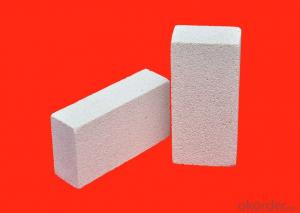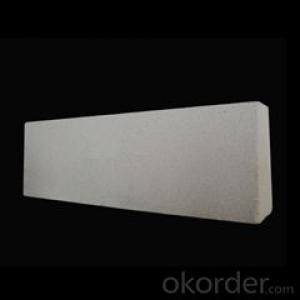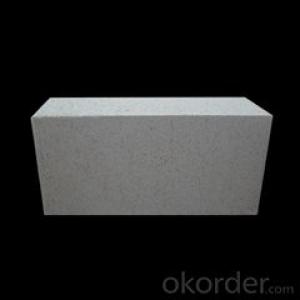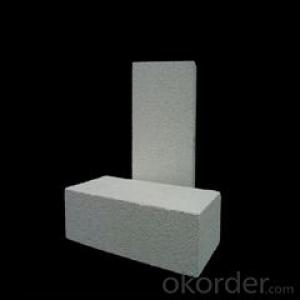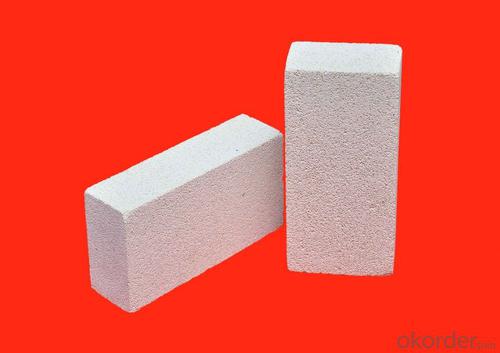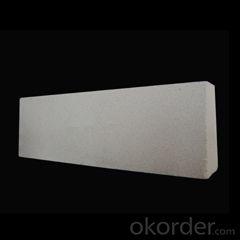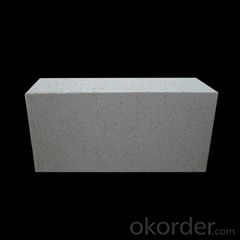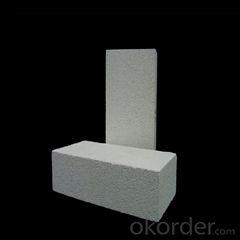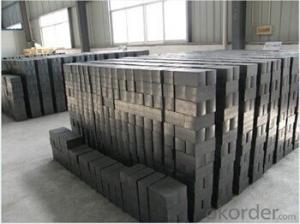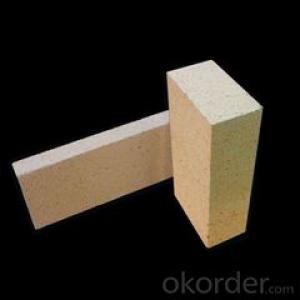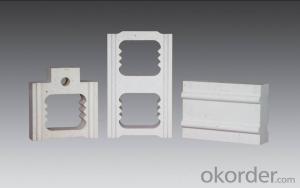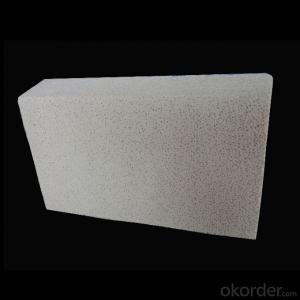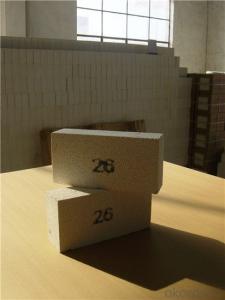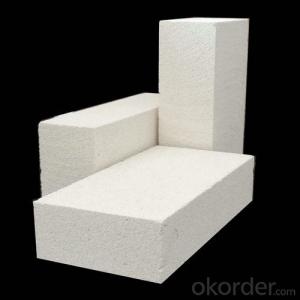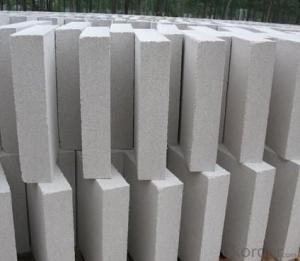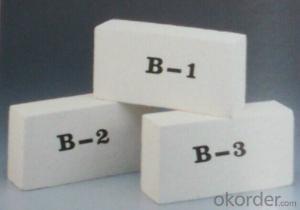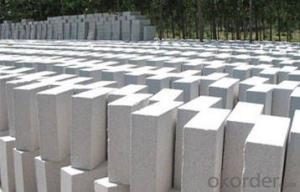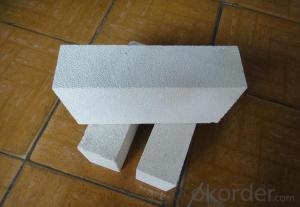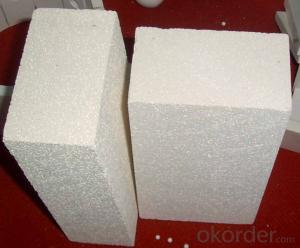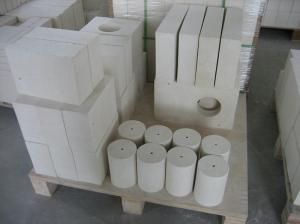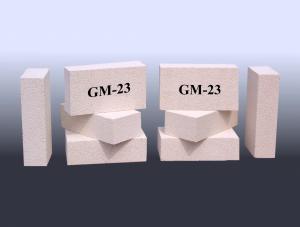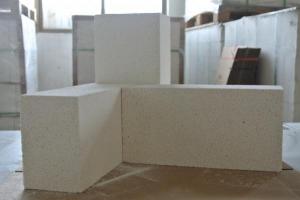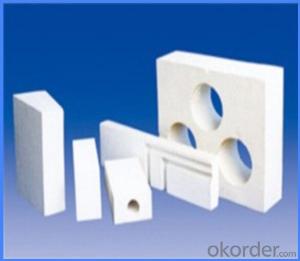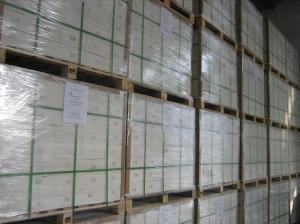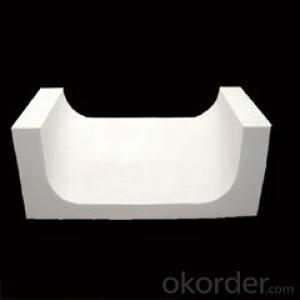Insulating Fire Brick - Refractory Mullite Insulating Refractory Brick JM 95
- Loading Port:
- Shanghai
- Payment Terms:
- TT OR LC
- Min Order Qty:
- 5000 kg
- Supply Capability:
- 10000 kg/month
OKorder Service Pledge
OKorder Financial Service
You Might Also Like
Refractory mullite insulating refractory brick JM 23
Okorder series heat insulation brick
Okorder series thermal insulation brick is an effective, energy saving, low carbon, environmental protection advanced, according to the ASTM standard manufacturing products. Okorder series products are best Li Ning and insulation in all types of industrial furnaces in the metallurgical field, aluminum, petrochemical, electric power and glass ceramic materials. They can be used as part of the working layer of thermal insulation or non - melting. Products have been widely used in the following furnace, achieved satisfactory results.
Application of heat preservation brick
Metallurgical Industry: blast furnace, hot blast furnace, heating furnace, etc..
Petrochemical Industry: ethylene cracking furnace, hydrogen production furnace, primary reformer, heating furnace, etc..
Ceramic industry: roller kiln, kiln, etc..
Glass industry: glass furnace regenerator, etc.
Carbon industry: carbon furnace, etc..
Aluminum electrolysis industry: aluminum reduction cell, etc.
Other industries: tunnel kiln, shuttle kiln, etc..
Advantages of heat insulation brick
Low thermal conductivity: more porosity will bring good thermal insulation effect, energy saving.
High crushing strength: high crushing strength, volume stability.
Low heat storage: small heat storage to absorb more heat, energy-saving effect is obvious.
Gao Chundu: iron, alkali metal impurity content is low.
The precise size: Brick size processing precision, special shape cutting and grinding, accelerate the brickwork.
Insulating brick picture
Common problem solutions
1. What products do you have?
We have all kinds of refractory bricks, refractory casting materials, mortar, cement, ceramic fiber products, etc..
Or you can browse our products to choose what you need.
2. How to control product quality?
With strict quality control system throughout the material selection and production process, we have the quality of refractory materials and ceramic fiber products to meet customer requirements.
From the selection of raw materials, the quality of our control to start. The quality certificate of the raw material is required, each batch of the products are to be tested in the use of the forward line. In the production process, the quality control by the workers, and then each piece of classification, and through the quality supervision and inspection.
3. Can you give me a brief introduction to the application of your product?
My company is mainly engaged in refractories in the steel, cement, glass, ceramics, petrochemical, electric power and other industries.
4. What information do you need if I need you?
In order to select the right products, we will provide us with information, such as the United States, technical data, order quantity, product application, etc..
If you have any questions, please contact us.
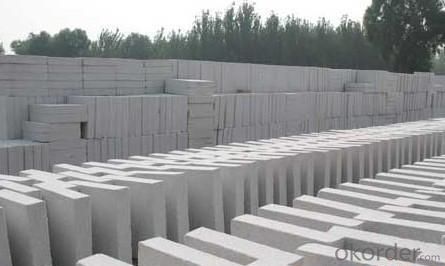
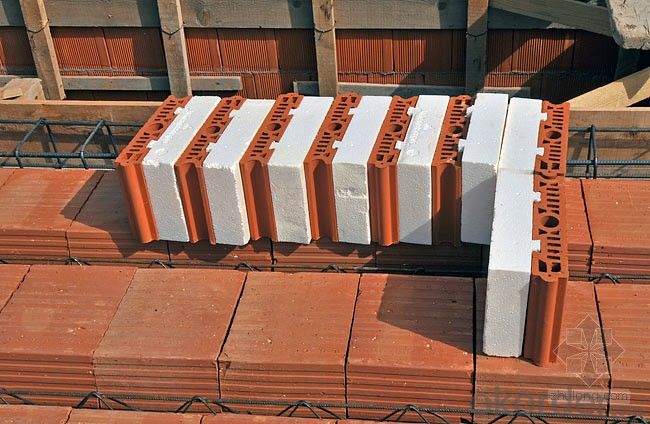
- Q: Can insulating fire bricks be used in the construction of smelting ovens?
- Indeed, the utilization of insulating fire bricks in the construction of smelting ovens is indeed possible. These fire bricks are specifically engineered to possess a low thermal conductivity, enabling them to effectively retain heat. This particular characteristic renders them particularly well-suited for applications requiring the consistent maintenance of high temperatures, such as smelting ovens. Smelting ovens serve the purpose of melting and refining various metals and minerals. These procedures entail the utilization of exceedingly high temperatures, making it crucial to minimize heat dissipation in order to ensure efficient and effective smelting. By providing exceptional insulation and reducing heat dissipation, insulating fire bricks can contribute to the achievement of this objective. Insulating fire bricks are manufactured using lightweight materials, including ceramic fibers or expanded clay, which are renowned for their superior insulating properties. These fire bricks are capable of withstanding temperatures of up to 3000°F (1650°C), rendering them suitable for the intense heat generated within smelting ovens. Moreover, insulating fire bricks demonstrate resistance against thermal shock, enabling them to endure rapid temperature fluctuations without suffering from cracks or breakages. This quality is of utmost importance in smelting processes, which frequently involve cycles of heating and cooling. Furthermore, insulating fire bricks are highly malleable and can be easily cut or shaped to accommodate specific dimensions or designs. This inherent flexibility renders them highly adaptable for the construction of smelting ovens of varying shapes and sizes. To summarize, the implementation of insulating fire bricks in the construction of smelting ovens is an exceptional choice due to their low thermal conductivity, high resistance to extreme temperatures, ability to withstand thermal shock, and ease of customization. These fire bricks effectively maintain high temperatures, minimize heat dissipation, and ensure the efficiency of smelting processes.
- Q: Do insulating fire bricks have a low coefficient of thermal expansion?
- Yes, insulating fire bricks typically have a low coefficient of thermal expansion.
- Q: Are there any special requirements for the use of raw materials in thermal insulation brick production equipment? What about the raw materials?
- . The control system needs to break, pouring the completion of data acquisition and process control of production site, steam curing process monitoring and control, production line of aerated brick Deyi heavy do better and integrity, production operation management etc..
- Q: Can insulating fire bricks be used for insulation in drying ovens?
- Yes, insulating fire bricks can be used for insulation in drying ovens. These bricks are designed to withstand high temperatures and are excellent at retaining heat, making them an ideal choice for insulating drying ovens. They help to minimize heat loss, improve energy efficiency, and maintain a consistent temperature within the oven, ensuring better and more efficient drying of materials.
- Q: Can insulating fire bricks be used in textile industry kilns?
- Insulating fire bricks are indeed applicable in the textile industry kilns. These bricks are specifically designed to endure extreme temperatures while providing exceptional insulation, rendering them appropriate for kiln usage. Within the textile industry, kilns are utilized for multiple procedures including fabric dyeing, drying, and curing. Implementing insulating fire bricks in these kilns guarantees the maintenance of a consistent and regulated temperature, resulting in efficient and uniform dispersion of heat. Furthermore, these fire bricks aid in minimizing heat loss, thereby leading to energy conservation and enhanced operational effectiveness. Hence, due to their thermal insulation properties and ability to endure high temperatures, insulating fire bricks are an ideal choice for textile industry kilns.
- Q: Are insulating fire bricks suitable for insulation in power boilers?
- Insulating fire bricks may be appropriate for insulating power boilers depending on the boiler's specific needs and conditions. Insulating fire bricks are renowned for their resistance to high temperatures and low thermal conductivity, resulting in enhanced energy efficiency and reduced heat loss in various applications. However, when contemplating their utilization in power boilers, several factors must be taken into consideration. Firstly, the boiler's operating temperature and pressure must be evaluated to ensure that the insulating fire bricks can endure these conditions without any degradation or failure. Power boilers typically operate under high temperatures and pressures, necessitating the selection of insulating fire bricks with a high temperature rating and the ability to withstand the required pressure. Furthermore, the composition and structure of the insulating fire bricks should be accounted for. Some power boilers may contain corrosive or abrasive substances that could potentially damage the insulating fire bricks over time. As a result, it is imperative to choose insulating fire bricks that are resistant to corrosion and abrasion, or to consider additional protective measures such as coatings or linings. Additionally, the thermal conductivity of the insulating fire bricks should be assessed. Although insulating fire bricks have lower thermal conductivity compared to other refractory materials, it is crucial to ensure that they provide adequate insulation for the power boiler's specific requirements. This may involve calculating heat transfer rates and determining the appropriate thickness and density of the insulating fire bricks to achieve the desired insulation performance. Ultimately, the suitability of insulating fire bricks for insulation in power boilers is contingent upon careful consideration of factors such as temperature, pressure, composition, structure, and thermal conductivity. Seeking guidance from experts and conducting thorough evaluations and calculations will assist in determining whether insulating fire bricks are a suitable choice for insulation in a particular power boiler application.
- Q: Can insulating fire bricks be used in refractory linings for boilers?
- Yes, insulating fire bricks can be used in refractory linings for boilers. These bricks have high insulating properties and can withstand high temperatures, making them suitable for use in boiler linings to reduce heat loss and improve energy efficiency.
- Q: Are insulating fire bricks resistant to acid attack?
- Yes, insulating fire bricks are resistant to acid attack.
- Q: Are insulating fire bricks resistant to water penetration?
- Yes, insulating fire bricks are resistant to water penetration. These bricks are designed to have a low porosity and are made from materials that are not prone to absorbing or retaining water. They are typically composed of lightweight refractory materials such as alumina, silica, and other minerals that have high heat resistance and low water absorption properties. This makes insulating fire bricks ideal for applications where water penetration could be detrimental, such as in high-temperature environments or when used as insulation in chimneys or kilns. However, it is important to note that while these bricks are resistant to water penetration, they are not completely impervious to it. Prolonged exposure to water may eventually lead to some level of water absorption, which can affect their insulating properties. Therefore, it is advisable to take precautions and ensure proper installation and maintenance to maximize their resistance to water penetration.
- Q: Are insulating fire bricks resistant to moisture absorption?
- Yes, insulating fire bricks are highly resistant to moisture absorption. They are designed to have low porosity and are made from materials that do not readily absorb water. This makes them ideal for applications where moisture resistance is crucial, such as in kilns, furnaces, and other high-temperature environments.
Send your message to us
Insulating Fire Brick - Refractory Mullite Insulating Refractory Brick JM 95
- Loading Port:
- Shanghai
- Payment Terms:
- TT OR LC
- Min Order Qty:
- 5000 kg
- Supply Capability:
- 10000 kg/month
OKorder Service Pledge
OKorder Financial Service
Similar products
Hot products
Hot Searches
Related keywords
